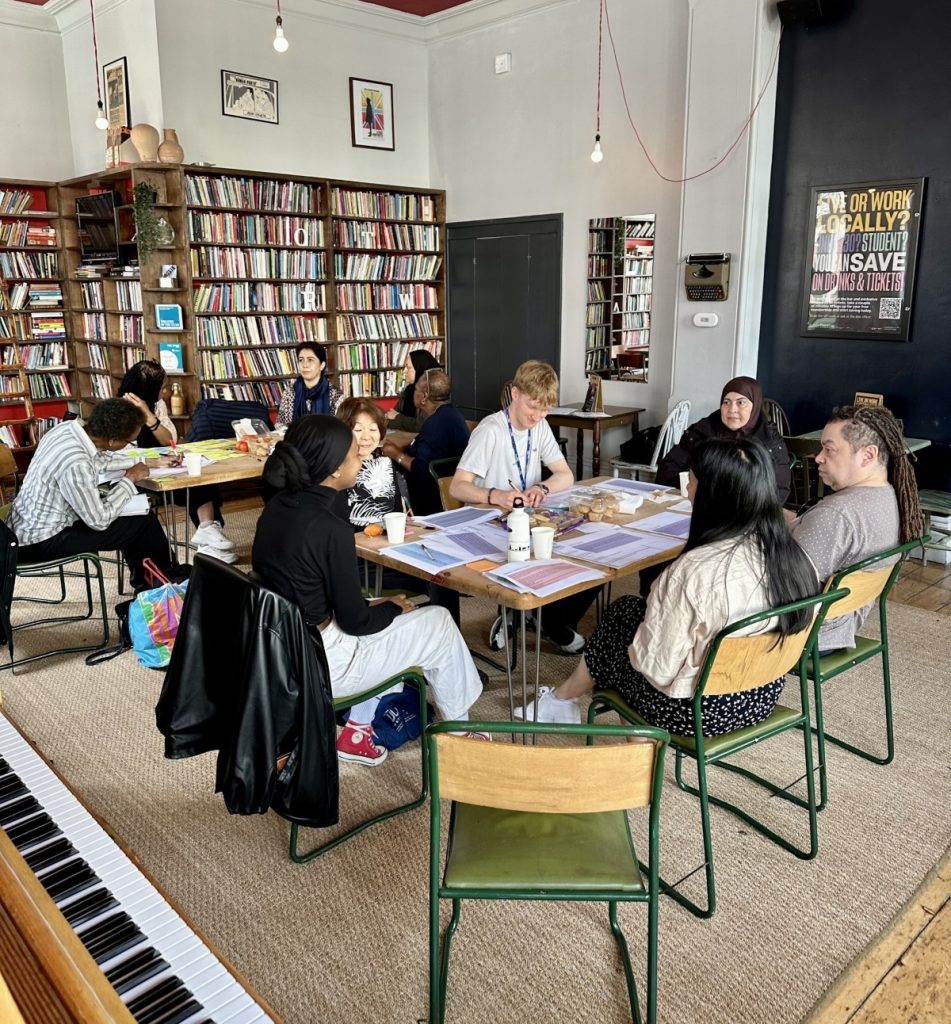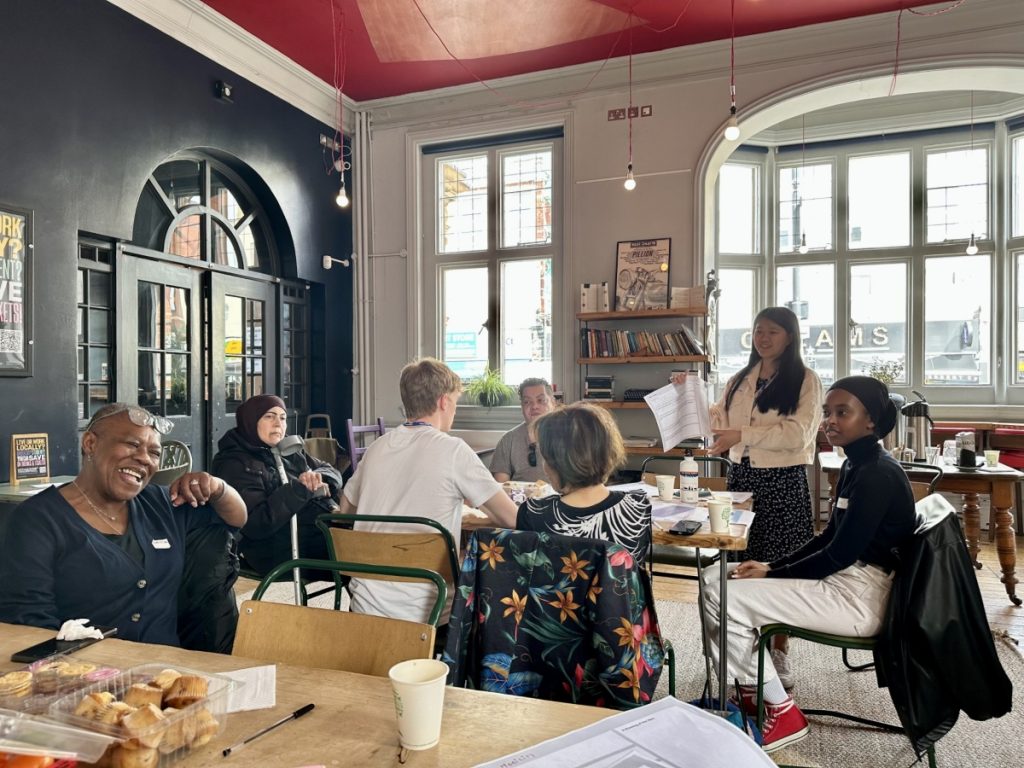We know people are waiting a long time to receive treatment. We also know people living in less advantaged areas experience health inequalities. Imperial College Healthcare NHS Trust and the Helix Centre carried out a project, funded by the North West London Integrated Care Board, to understand the challenges faced by people living in less advantaged areas while waiting for orthopaedic treatment and to design tailored support initiatives that might help people to live well while waiting. To do this, we interviewed 7 patients to understand their experience of waiting for an orthopaedic procedure. Then we held a workshop with 8 patients at the Bush Theatre to design support ideas in response to the key insights from the interviews.
To ensure this project was informed by those with lived experience, we recruited two public partners to work with us throughout the project. In this blog post, our public partners Abiola Awojobi-Johnson and Mieko Wertheim tell us about their experience of being involved.
Why did you want to get involved in this project to help people live well while waiting?
Abiola: I’ve got lived experience of being on waiting lists for a very long time – literally years! I felt it was really important to be a lived experience voice for the wilderness of waiting: the physical and emotional impact of waiting when there’s no end in sight. When there’s no date set, you can feel forgotten, and I really wanted to be part of a project that would help with that.
Mieko: I’ve been on waiting lists for almost 50 years – all my married life. So I’m kind of used to it – I’ve been patiently waiting and didn’t even think about how things could be better. But I like any problem solving role, so if there is a way to improve things, that would be nice.

What did you hope this project would achieve?
Abiola: I liked that this project wasn’t about trying to jump the queue or make the wait quicker, although that would be nice. This project was about how to wait well, and that’s what attracted me to it. We all know what the NHS is dealing with, the fallout from COVID and how hard everyone is working, so what I was interested in exploring was how we can wait well. As we know, our physical and mental health are so closely related, and if people aren’t feeling great while they’re waiting because they can’t walk down to the shops or go to the park or walk their dog, that’s going to have a knock on effect on their mental health as well. So, my hope with this project was not so much about shortening the wait, but thinking about how we can still have a good quality of life while waiting.
How were you involved in the project?
Abiola: Our role was first and foremost to provide the lived experience voice. We helped come up with the interview questions, reviewed the recruitment materials, read through the interview transcripts to pick out themes that were important from a patient perspective, and played a big role at the workshop where we got involved in discussions with our peers. So really just being involved from the get go.
And can you give an example of how your involvement impacted the project?
Mieko: English is not my first language, so when I was reviewing the interview questions, there were some questions that were hard to understand. I worked with the team to make the language a lot more clear. Also, at the workshop, I was friendly and helped the participants feel more relaxed and comfortable speaking.
Abiola: For me, there were a couple of things. With the interviews, I suggested adding a question around the impact of waiting on patients’ relationships with their family and friends. As a carer, this was important to me and it was something the team said they wouldn’t have thought to include otherwise.
The other thing was my idea of a ‘window to well-being whilst waiting’. The idea was to look at the positive things one can do while waiting, so that we approach the waiting process from a different perspective. I got the idea from a project with prisoners, where people went to prison and came out with a degree three years later. I wanted to borrow that way of thinking and recognise that we can’t speed up our wait, but we can change what we do while waiting so that it aligns with our values and interests. That could be taking up a new hobby, learning a new language, or doing some volunteering – just something positive you can do that takes the emphasis off the wait. I feel really proud to have created that idea, and I’m so glad to see that it has manifested into an actual outcome that is being taken forward by the Trust.
“I think it’s really important that people get involved, and I hope researchers can create accessible and meaningful opportunities for them to do so.”
– Abiola Awojobi-Johnson, public partner
What parts of the project did you most enjoy?
Mieko: For me, it was exchanging ideas from different points of view. I thought the team did a brilliant job of recruiting a wide variety of people with different ages, genders, ethnicities, and experiences. Some people were waiting for treatment because of an accident, for others it was chronic pain. And I learned how different each of their experiences was, and their different philosophies around waiting and the variety of emotions they felt.
What worked well on the project?
Abiola: The underpinning model of co-production guided everything, and that was the most important thing. To me, co-production is about feeling authenticity. I’ve worked on a few projects, and you can always tell when there’s a true authenticity in working alongside people. If you can see the lived experience experts as a peer or a colleague, then I think that’s a true model of co-production. If you’re still categorising us into the carers, or the patients, or the ones who are waiting, then that’s not a true model because you’re still thinking about ‘us and them’.
Mieko: This was my first time being so involved with a project. I’ve taken part in workshops before, but this was very different. You have to look at things from different aspects, and at the start I felt I didn’t know the answers, so it wasn’t easy. But I think my confidence grew throughout the project and now I feel more comfortable leading discussions and sharing my lived experience, instead of taking on a more passive role. It was a very good experience.

Would you recommend other people get involved in these kinds of projects?
Mieko: Yes, you get a chance to get inside a project and get the inside story. And you see that there are people working hard to make things better, and it gives you a reason for hope. So, I actually do recommend these opportunities to my friends when I see them now. I share with them what I’ve done and what it’s like to be involved, and I encourage them to sign up.
Abiola: Yes, I think it’s really important that people get involved in projects like this. The lived experience voice is really important and should be at the heart of projects like this, so you can be a part of making a difference. And you get something out of it as well. It might seem difficult at the beginning, but once you get going there is such a sense of fulfilment. And there is a spiritual benefit of knowing other people are having a similar health experience to you. Usually, I could walk past a person on the street or sit next to them on the bus and not know that they are waiting for treatment as well, but this project allowed me to hear other people’s stories and feel like I was part of a silent army with a growing voice. There is a real strength and solidarity in that. So I think it’s really important that people get involved, and I hope researchers can create accessible and meaningful opportunities for them to do so.